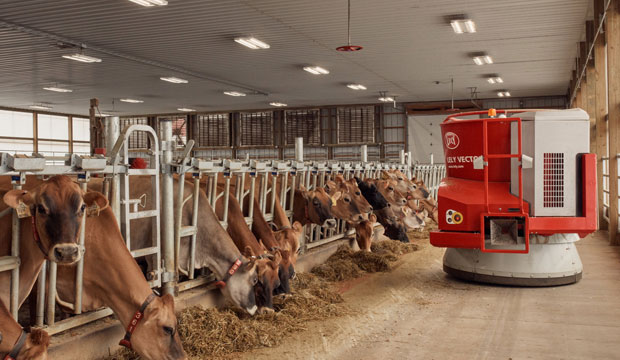Thanks to member Bettsy Mosimann for tracking down this most interesting article on the application of high tech agriculture on small farms.
Rivendale Farms outside Pittsburgh is a laboratory for applying technology to smaller farms.
About 150 Jersey cows in the rolling terrain at Rivendale Farms in Bulger, some 25 miles west of Pittsburgh, wear Fitbit-like collars that monitor their movement, eating and rumination patterns. They are milked not by humans but by robotic machines.
A nearby greenhouse, about a quarter-acre in size and filled with salad-bowl crops like kale, arugula and baby carrots, is automated. The temperature, humidity and sunlight are controlled by sensors and retractable metallic screens. And soon, small robots may roam the farm’s eight acres of vegetable crops outdoors to spot disease and pluck weeds.
Farming in America is increasingly a high-tech endeavor. Combines guided by GPS, drones, satellite imagery, soil sensors and supercomputers all help the nation’s food production. Yet that technology is mainly tailored for big industrial farms, where fields stretch as far as the eye can see.
Rivendale Farms, which has just completed its first year of full operations, offers a glimpse of technology coming available for smaller farms.
Technology for giant farms is all about increasing yields and cutting costs. For smaller farms, too, efficiency is paramount. But technology can also eliminate a lot of tedious, routine labor — a lifestyle payoff that can help persuade a younger generation to stay put on family farms rather than sell out.
Smaller farms typically raise specialty crops on limited acreage. Specialty farming requires a scaled-down approach, like the small robots being developed for Rivendale by scientists at nearby Carnegie Mellon University and the expanding array of equipment from the “slow tools” movement, a group of farmers and engineers designing affordable tools for small farms.
The goal at Rivendale, said Thomas Tull, the farm’s owner, is to create a “boutique, cutting-edge farm, enabled by technology, that produces great food.”
Rivendale can afford its combination of cutting-edge commercial technology and science experiments because Mr. Tull is a billionaire serial entrepreneur, investor in tech-related ventures and former film producer. He is also on the board of Carnegie Mellon. He has spent several million dollars on Rivendale so far. But the plan, Mr. Tull said, is for the farm to become self-sustaining by 2020.
NY TIMES: Steve Lohr, January 13, 2019

